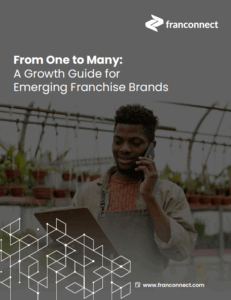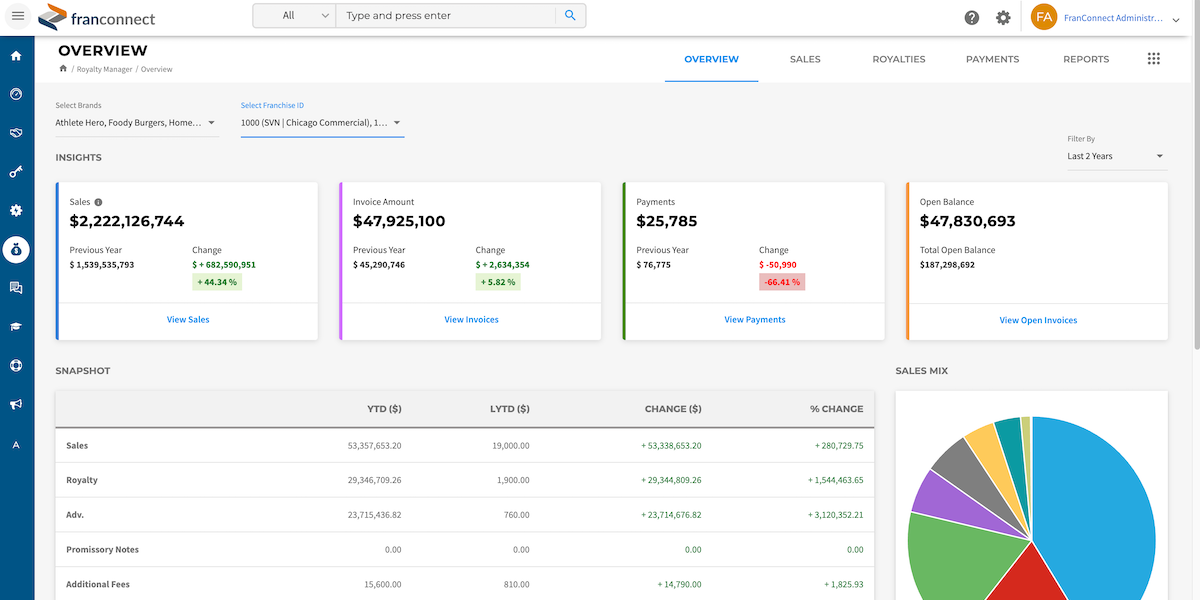In an era where brand loyalty is increasingly fragile, businesses operating across multiple locations must ensure consistency in operations, compliance, and customer experience. Over 80% of Quick Service Restaurants (QSRs) have adopted digital tools, yet many struggle to harness the full potential of the data these tools generate. A unified data management approach ensures brand consistency, strengthens compliance, and enhances customer loyalty.
This white paper explores how unifying data from disparate systems through an integrated platform like FranConnect can drive operational excellence, enhance decision-making, and optimise customer retention.
The Challenge: Fragmented Data and Inconsistent Operations
QSR brands and multi-location businesses rely on a variety of digital tools for online ordering, inventory management, workforce scheduling, training, and customer feedback. However, when these tools operate in silos, data remains fragmented, leading to:
- Inconsistent brand experience across locations
- Compliance and regulatory risks
- Poor decision-making due to a lack of real-time insights
- Reduced operational efficiency and increased costs
- Declining customer satisfaction and loyalty
The Solution: A Unified Data Ecosystem
To overcome these challenges, businesses need a centralised, cloud-native platform that integrates disparate data sources and delivers a real-time, holistic view of operations.
Key Benefits of a Unified Data System:
- Brand Consistency Across Locations
-
- Standardised training and compliance protocols ensure a uniform customer experience.
- AI-driven operational analytics detect inconsistencies and provide actionable insights.
- Automated task management and playbooks help maintain brand standards.
- Enhanced Operational Compliance
-
- Digitised food safety and quality control checks reduce compliance risks.
- Real-time tracking of corrective actions ensures compliance with industry regulations.
- Mobile and offline capabilities enable seamless reporting from any location.
- Optimised Decision-Making Through AI and Analytics
-
- AI-powered insights generate predictive analytics for growth forecasting.
- Operational benchmarking enables brands to measure performance against industry standards.
- Automated insights streamline operational execution, reducing inefficiencies.
- Improved Customer Experience and Loyalty
-
- A consistent brand experience increases customer trust and retention.
- Real-time feedback loops help address customer concerns promptly.
- Integrated customer engagement tools personalise interactions and drive loyalty.
Case Study: The FranConnect Advantage
FranConnect, a leading franchise and multi-location management SaaS platform, serves over 1,500 brands across 146 countries, managing 1.3 million locations. Through its cloud-native platform, FranConnect offers a real-time, data-driven approach to operational consistency, compliance, and customer engagement. By uniting disparate systems, brands gain a single source of truth, ensuring uniform standards across all locations.
Future Trends in Digitalisation and Data Integration
- Agentic AI for Automated Execution: AI-driven automation will streamline compliance and operational execution, reducing human error.
- IoT Integration for Real-Time Monitoring: Unified IoT networks will provide deeper insights into supply chain and operational efficiency.
- AI Video Analytics for Customer Flow Optimization: AI-powered video analytics will enhance customer experience by optimizing store layouts and service speed.
Conclusion: Unifying Data as a Competitive Advantage
In a highly competitive QSR and multi-location business environment, the ability to unify data across disparate systems is no longer optional—it is a necessity. Businesses that leverage integrated platforms to standardise operations, enhance compliance, and deliver a consistent brand experience will gain a competitive edge in fostering customer loyalty and operational excellence.
Written by: Nick Mecozzi, SVP of Solutions, FranConnect










 Ian Walsh
Ian Walsh








